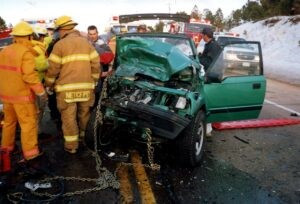By Ed Wood, for DUID Victims Voices Lukas Myers knows this. The photo shows him being extracted from a car when he was 12 years old after a crash caused by a marijuana-impaired  driver. Most bones in both of Lukas’s legs were broken as well as both wrists.
driver. Most bones in both of Lukas’s legs were broken as well as both wrists.
For some, stories like this are convincing.
Others need data.
So here is a summary of relevant data from 10 sources.
- Percent of drivers who admit driving after marijuana use:
- Toxicology tests of those arrested for DUI[3]:
| Drug category | Number | |
| Cannabinoids | Positive screens | 4,205 |
| THC positive | 4,069 | |
| Alcohol | 3,956 | |
| Benzodiazepines | 1,774 | |
| Methamphetamine and similar | 1,090 | |
| Cocaine | 838 | |
| Opioids/opiates | 699 | |
| Sleeping Zs | 115 | |
| Barbituates | 51 |
Note: CBI data from Jul 2019 to Jun 2020 when all DUI blood samples were tested for both alcohol and a full drug panel.
- DUI charges– percent caused by alcohol, THC and polydrug use – 3 year trend [4]
| 2016 | 2018 | Percentage change | |
| Alcohol | 78.8% | 75.3% | -4.4% |
| THC | 5.4% | 6.4% | +18.5% |
| Polydrug | 12.7% | 14.5% | +14.2% |
- Traffic deaths per Billion Vehicle Miles Traveled (BVMT):
- Increased from 9.91 in the five years before marijuana commercialization to 11.26 in the five years after marijuana commercialization[5].
- Increase of 1.46 deaths/BVMT per year adjusted after marijuana commercialization, compared with a synthetic control[6].
- Increase of 1.9 deaths/BVMT per year adjusted after marijuana commercialization, compared with states with stable legalization policies[7].
- Increase of 1.7 deaths/BVMT per year non-adjusted after marijuana commercialization compared with states without legal recreational or medical marijuana[8].
Note: the above reports measured the effect of marijuana commercialization in 2014, not marijuana legalization in 2012.
- Traffic fatalities implicating THC:
There were 632 traffic fatalities in 2018. 87% of the drivers in those fatal crashes were tested for drugs. 83 tested positive for THC including 36 at or above 5 ng/ml[9].
- Vehicular homicide convictions by drug group in 2016[10]:
| Drugs detected | Number |
| Alcohol only | 10 |
| THC only | 2 |
| Single other drug only | 1 |
| Alcohol + THC | 2 |
| Alcohol + other drug | 1 |
| Alcohol + THC + other drug | 2 |
So what is Colorado doing about the problem?
Deny the problem exists
In 2020 the Department of Motor Vehicles revised the Driver Handbook to say, “…it is unclear whether cannabis use increases the risk of car crashes.”
Encourage marijuana use
During the COVID pandemic shutdown, marijuana dealers were classified as an “essential business” by the Governor, permitting them to sell their product while non-essential businesses were required to close.
Home delivery of marijuana was authorized, ostensibly to reduce drugged driving.
At the December 14, 2020 meeting of the Retail Marijuana Public Health Advisory Committee, the Colorado Department of Public Health an Environment announced that henceforth, “marijuana users” were to be referred to as “cannabis consumers” since the former label is pejorative. You just can’t make this stuff up.
Subsidize the marijuana industry
Governor Polis announced a $584,399 tax credit to Canadian marijuana company SLANG Worldwide to expand operations in Colorado.
On a side note that may not be completely unrelated, Governor Polis is rated A+ by NORML, the National Organization to Reform Marijuana Laws.
[1]https://marijuanahealthinfo.colorado.gov/health-data/behavioral-risk-factor-surveillance-system-brfss-data
[2]https://marijuanahealthinfo.colorado.gov/health-data/healthy-kids-colorado-survey-hkcs-data
[3] https://us17.campaign-archive.com/?u=8c19b56d089ffb41f61475b71&id=7e46389639
[4] Rosenthal A, Reed J. Driving Under the Influence of Drugs and Alcohol. Colorado Department of Public Safety, Division of Criminal Justice, Office of Research and Statistics, Nov 2020
[5] Federal Highway Administration, https://www.fhwa.dot.gov/resources/pubstats/
[6] Santaella-Tenorio J, Wheeler-Martin K, DiMaggio CJ et al. Association of Recreational Cannabis Laws in Colorado and Washington State With Changes in Traffic Fatalities, 2005-2017. JAMA Intern Med. Published Online June 22 (2020)
[7] Aydelotte JD, Mardock AL, Mancheski CA et al. Fatal crashes in the 5 years after recreational marijuana legalization in Colorado and Washington. Accident Analysis and Prevention 132 (2019) 105284
[8] Kamer RS, Warshafsky S, Kamaer GC. Change in Traffic Fatality Rates in the First 4 States to Legalize Recreational Marijuana. JAMA Intern Med. Published Online June 22 (2020)
[9] Gorman T. The Legalization of Marijuana in Colorado: The Impact. Vol 6 Sept 2019. Rocky Mountain High Intensity Drug Trafficking Area
[10] Bui B, Reed J. Driving Under the Influence of Alcohol and Drugs. A Report Pursuant to HB 17-1315. July 2018. Colorado Division of Criminal Justice
